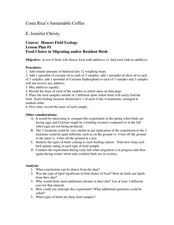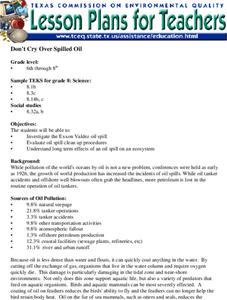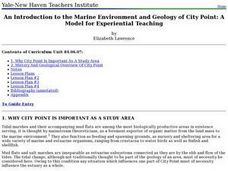Curated OER
For The Birds
Student make bird feeders and describe feeding behaviors. In this bird feeder lesson plan, students construct simple bird feeders. They then put them outside and observe the feeding behaviors of birds. Then they graph the number of birds...
Curated OER
Week 7: Animal Adaptations - Bird Beaks
Learners use tools to represent bird beaks and pick up different types of food with them in order to discover which beak would help the bird survive depending on their food type.
Curated OER
Bird Feeding and Migration Observation
Students research bird migration and build a bird house. In this bird lesson plan, students research the birds in their area and where they migrate to. They also build their own bird house and record data on what kinds of birds come to...
Curated OER
Feeding the Birds
Students build bird feeders. In this aviary lesson, students build different types of bird feeders. This web page includes information on which type of feeder attracts which birds and what food to use with the certain feeder type.
American Museum of Natural History
What's This? Feeding
Some species have pretty creative methods for catching food. Young scientists learn about some interesting ways organisms get the nutrients they need by navigating an online interactive lesson that would be suitable for a remote learning...
Curated OER
Competition as a Function of Interactions in the Environment
Students set up various feeding stations and observe bird behavior and gather data.
Curated OER
Bird Beak Adaptation Lab
Middle schoolers investigate bird beaks to determine which physical adaptations are necessary based on the types of food the birds eat. They participate in a lab by visiting multiple stations to determine which beaks are most efficient,...
Curated OER
Costa Rica's Sustainable Coffee
Students experiment to see if birds prefer to eat bird seed with additives vs. no additives. In this experimental lesson students test to see if birds notice a difference between additive and no additive food.
National Wildlife Federation
Massive Migrations: Grades K-4
Bird migration is a fascinating behavior. Budding scientists experience their own migrations using the school grounds for their flight patterns. They follow a map that leads them through a migration pattern that includes stops for...
Curated OER
Being Alive
Young biologists use a activity to fill in the blanks of five sentences. Each one needs a word from a word band at the top of the resource. All of the sentences are about things that are alive, and how we know they are alive. The words...
ARKive
Biodiversity and Evolution
Why is diversity in biology so important for an ecosystem? Explore biodiversity, evolution, and natural selection with a presentation for your biology class. It features clear information, activities for further understanding, and...
Curated OER
Toothpick Worms
Young scholars investigate camouflage. In this science lesson plan, students experience the role of color in camouflage as they complete a hands-on activity.
Curated OER
Animals
Second graders define and describe the characteristics of a mammal and a mammal's importance to man. They also describe the life cycle of a frog and compare and contrast a larva and an adult frog. Finally, 2nd graders study and explain...
Curated OER
Don't Cry Over Spilled Oil
Students study the Exxon Valdez Oil Spill while evaluating oil spill clean up activities. They discover the long term impact can have on an ecosystem by completing this experiment.
Curated OER
Pollination of Flowers by Moths
Turn your classroom into a pollination station as your kids transform into moths or predators trying to survive and aiding in plant reproduction along the way. Using silent party blowers as proboscises, the moths will have two minutes to...
Curated OER
Owl Pellets
Students examine and discuss what owls eat and how their digestive system works. They dissect owl pellets, identify the bones found, and analyze and record the results.
Curated OER
Simple Present or Present Continuous Exercise #1
In this simple present or present continuous worksheet, students fill in fifteen blanks with the appropriate verb tense that makes each sentence grammatically correct.
Curated OER
An Introduction to the Marine Environment and Geology of City Point: A Model for Experiential Teaching
Students begin the lesson plan by researching the history of City Point, Connecticut. Using a map, they color areas they were asked to find and discuss why the areas are important to the community. As a class, they are shown recent...
Curated OER
Wacky Water Critters
Young scholars visit a local creek or stream. They collect water samples from the creek and observe and sort the "water critters" they find in the sample, observing smaller organisms under a microscope if necessary. They identify each...
Curated OER
Getting To Know You:learning the Aza Ssp Terminology
Students discover the role zoos play in conservation of animals. They research the captive breeding programs that are in place at the Minnesota Zoo. They use the zoo's website to find the American Zoo and Aquarium Associations criteria...
Curated OER
Using Science Skills to Investigate Japanese Quail
Sixth graders explore Japanese Quail. They generate and record scientific questions about the quail. Students gather information from various sources and record their data. They compose an inquiry report and include it in a portfolio.






















